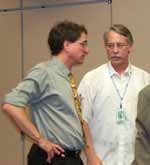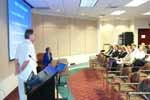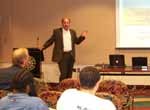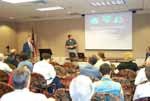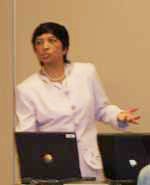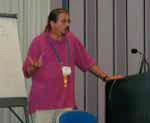How can urban residents use an understanding of the metropolis as an ecological system to improve the quality of their lives? How can native traditional knowledge be integrated with the teaching of ecological principles? How can LTER research be used to teach a wider spectrum of students?
These and other questions were discussed at the first LTER Education Symposium held at the National Science Foundation, 19 June 2002. Education representatives from six LTER sites participated in this event involving a diversity of habitats and regions. The presentations were excellent and they attracted over 50 people.One third of the attendants were from the NSF Education and Human Resources Directorate, one-third from other NSF Directorates and one-third from 11 organizations including National Oceanic and Atmospheric Administration, Ecological Society of America, National Council for Science and the Environment, National Wildlife Federation and Howard University, who approached the presenters with many questions and interest following the presentations.
With the increased interest in environmental education at the NSF, this event was an opportunity to bring a sample of the types of education projects going on at LTER sites. Ideally, this symposium could become an annual event where we bring different sets of LTER projects every year, or we select topics of interest to LTER/NSF and organizations involved in environmental education.
At the symposium, we learned about the many possibilities for integrating research with education at LTERs, we learned about how to link graduate students with K-12 schools, how to form partnerships with schools and even how to turn the $15,000 NSF-LTER education supplement into an $800,000 endowment!
In the evening after the symposium, we attended a ceremony and reception to honor the recipients of the NSF Distinguished Teaching Scholars Awards. At the reception, the NSF Director, Deputy and several Assistant Directors expressed much interest in learning from LTER representatives about their education projects. I received messages from NSF Director and Deputy Director in support of LTER education activities.
This summer, LTER education representatives from 6 other sites participated in an evening session at the annual meeting of the Ecological Society of America in Tucson, AZ. The session provided an overview of education opportunities at LTERs and Biological Field Stations.Mark Stromberg represented the Organization of Biological Field Stations (OBFS). Robert Bohanan, Stephanie Bestelmeyer , John Moore, Susan Steiner, Marianne Krasny and Monica Elser represented LTERs. Participants talked briefly about how they promote education projects, involve minority students in LTER education and research, bring rigorous science to K-12 teachers, and partner with non-profit organizations.
The follow up discussion centered on what can be done to increase the utilization of field stations, how to fire up scientists to get involved in education projects, how to share data from different sites to use in K-12 schools and what technology to use, and the potential of bringing faculty from community colleges to LTERs and OBFS.
| LTER Education Symposium Presentations |
|
Welcome and Introductions (MS PowerPoint) The LTER Education Program: Historical Perspective (MS PowerPoint) Ecology Education in Baltimore, an Urban Ecosystem Traditional, Native and Global Ecology Education in Alaska Teacher-Scientist Partnerships for Science Literacy (MS PowerPoint) Seamless Environmental Education at North Temperate Lakes: (MS PowerPoint) Graduate Students Link with K-12 schools at Shortgrass Steppe Marine Science Education on the Eastern Shore of Virginia Concluding Remarks |


 Enlarge this image
Enlarge this image
